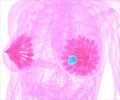New guideline developed to help clinicians manage genitourinary syndrome of menopause (GSM) in women with breast cancer, according to a released consensus.

‘Recommendations to provide clinicians with an approach to managing GSM in women with or at high risk for breast cancer were released by The North American Menopause Society (NAMS) and The International Society for the Study of Women's Sexual Health (ISSWSH).’





Left untreated, GSM can potentially adversely affect quality of life and partner relationships because of ongoing symptoms, including vulvovaginal dryness, burning, or irritation; painful intercourse; and recurrent urinary tract infections. It is estimated that more than 2 million survivors of breast cancer in the United States are affected by GSM, with most receiving no treatment.The Consensus Panel of 16 experts created the consensus recommendations after a comprehensive, evidence-based review of existing literature. In addition, the Consensus Panel agreed that decision making regarding the type of treatment for GSM should be individualized and include balancing the risk of cancer recurrence with the severity of symptoms and effect on quality of life. The recommendations offer clinicians caring for this population of women some guidance regarding therapeutic decision making in the absence of clinical trial data.
"We want clinicians caring for this at-risk population to be armed with as much information as possible so that they can provide the best course of treatment for their patients," says Dr. JoAnn Pinkerton, executive director of NAMS. "Until additional studies are undertaken in this area, we are hopeful these consensus recommendations will provide added confidence for clinicians to move forward with treatment options that will provide relief to women from GSM symptoms."
Source-Eurekalert















